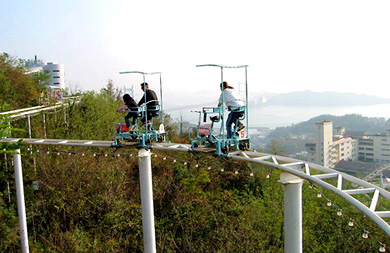
In
"Hot Politics," FRONTLINE recounts attempts by members of both Bush administrations, President Bill Clinton and Vice President Al Gore to get the United States to set mandatory carbon caps and sign international treaties on global warming.
It's a story about missed opportunities, suppressed science, empty rhetoric and politics as usual in America. What the story doesn't really focus on is
what's at stake: the survival of our planet.
I thought that conservative Newt Gingrich summed up the failures of the past three administrations best.
FRONTLINE: We've had three administrations: one early, and maybe not technology there yet; a second administration that reportedly knew everything about global warming; and now we've got another administration that has been saying all along that it's not a problem. Why do you think we have had three administrations who have not been able to deal with this issue on the federal level?
 Gingrich: Because the left insists on pain, and the right insists on avoidance, and you've had no real leadership that says there's a positive, economically rational, science-and-technology way to solve this that makes your life better, not worse, and gives you more options, not fewer. ...
Gingrich: Because the left insists on pain, and the right insists on avoidance, and you've had no real leadership that says there's a positive, economically rational, science-and-technology way to solve this that makes your life better, not worse, and gives you more options, not fewer. ...
While I can accept his contention that "more litigation, more regulation, bigger government, higher taxes" can be "painful," I don't accept his portrait of the left in general.
The left has this passion for using whatever issue they can find as an excuse to eliminate capitalism, to eliminate markets, to eliminate personal choice, to demand a lower standard of living. I think that's all, frankly, irrational.
Of course it's irrational, and a total misrepresentation. While I imagine that some liberals may want an end to capitalism, I believe most want to improve it, not destroy it. I'll give him this, though:
The average American, in fact, wants a healthy environment, but they also want a healthy economy. And the average American would like their political leadership to figure out a solution which is economically rational, environmentally favorable, and which leads to the creation of a better future using better science and technology to give them more choices and a higher quality of living.






 What good can $46 do? More than you might think. You can:
What good can $46 do? More than you might think. You can:
